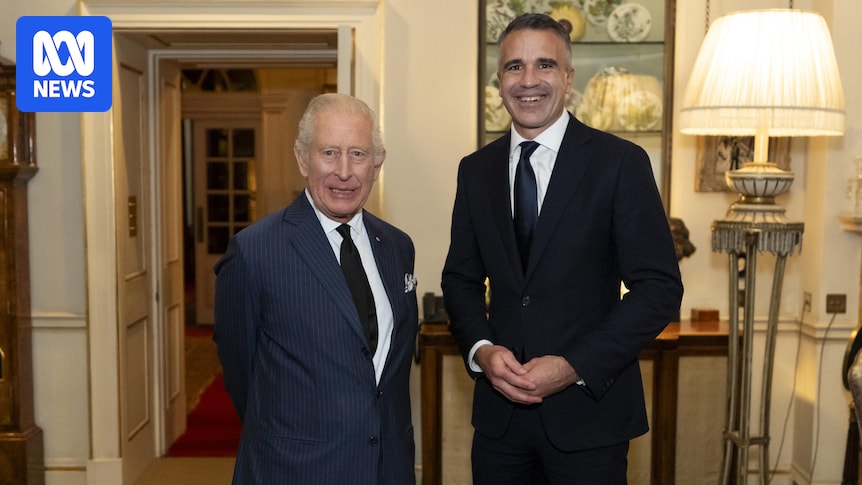South Australian Premier Peter Malinauskas says he would “love” King Charles to travel to Adelaide for the COP31 climate change summit in the event of Australia securing hosting rights.
Mr Malinauskas met with the sovereign on an official visit to the United Kingdom, during which he also signed an agreement with nuclear reactor manufacturer Rolls-Royce regarding the AUKUS submarine deal.
The premier told ABC Radio Adelaide that he and King Charles discussed next year’s UN climate summit during their meeting at Clarence House in London.
Adelaide’s anxious wait for COP31 decision
Australia and Türkiye remain locked in a long-running stand-off over the right to hold the COP31 summit in 2026, but Adelaide will be the host city if Australia emerges triumphant.
“It’s well known that the king’s got a very substantial interest in all things environmental, and South Australia, being a potential host of the COP conference next year, was certainly on the king’s mind,”
Mr Malinauskas said.
The premier said while it would be “inappropriate” to speak about “what bid the king is supporting”, he would “obviously love him to be there” if SA’s bid were successful.
“He has attended them [COP summits] in the past and I don’t think it’s unreasonable for me to say we would very much love it if he did [attend the 2026 summit], but ultimately it’s the UN’s event,” Mr Malinauskas said.
“The king is very attuned to what COP is about and what it represents and he’s certainly conscious of part of the merit of South Australia’s bid by virtue of the fact that he was well and truly aware of how far advanced South Australia is in terms of our penetration of renewables in our state.
“He was across the numbers.”
AUKUS components being built
During the trip to the UK, Mr Malinauskas attended the Defence and Security Equipment International arms conference, where the Trump administration’s review of the AUKUS deal was “a topic for conversation”, the premier said.
Under current plans, the SSN-AUKUS fleet will include nuclear reactors built by Rolls-Royce.
Mr Malinauskas said he and the British defence company signed a memorandum of understanding on commitments to workforce development and skills training in South Australia.
AUKUS faces an ‘American first’ test
“Rolls-Royce are going to have a presence here in Adelaide through this agreement,” Mr Malinauskas told ABC Radio Adelaide.
“The agreement between us and Rolls-Royce establishes the program or, I guess, the framework I should say, about how we’re going to do skills procurement for Rolls-Royce in a nuclear setting, which is about their collaboration with our TAFE, potentially with our technical colleges … but also with our universities.”
Earlier this week, Mr Malinauskas travelled to Rolls-Royce’s facilities in Derby in the English midlands.
He said despite doubts about the AUKUS project, work was already underway.
“There is nothing but a sense of urgency to get cracking on the construction of the SSN-AUKUS submarine which is ultimately a UK design,” he said.
“I saw firsthand the very first components that they are already manufacturing for Australia’s first nuclear submarine that will be built at Osborne.
“They are already building them … for the first of the SSN-AUKUS.”
SA Liberal energy spokesperson Stephen Patterson. (ABC News)
SA Liberal energy spokesperson Stephen Patterson said he had confidence the US review into the AUKUS pact would be “favourable”.
“The sooner that is brought to a head and a resolution, the better,” Mr Patterson said.
“We offer bipartisan support to ensure calls for the US review to be done expeditiously, is done as soon as possible.”
Mr Patterson also welcomed the government’s agreement with Rolls-Royce, saying it was crucial to the success of the project.
“The Liberal opposition wants to see as much of the skills and the work undertaken on the project to occur here in South Australia, and obviously Rolls-Royce building the nuclear propulsion system, is vital to that,” he said.
“The more involvement that South Australia can have, and Australia in general, in terms of working towards those nuclear propulsion systems, the better.”
